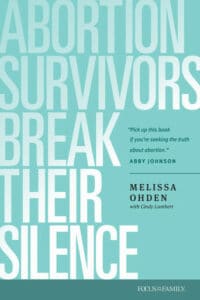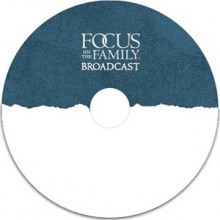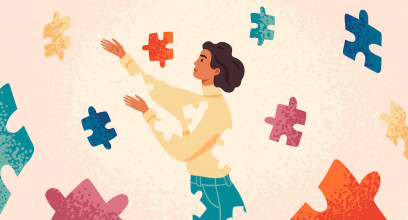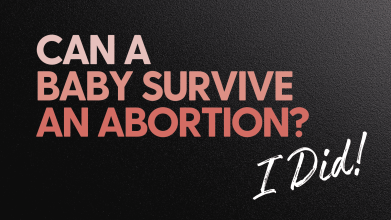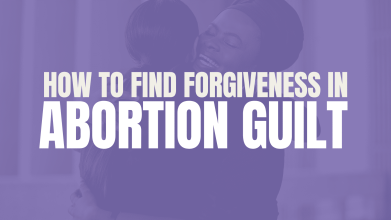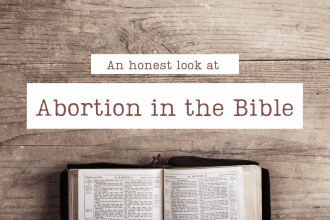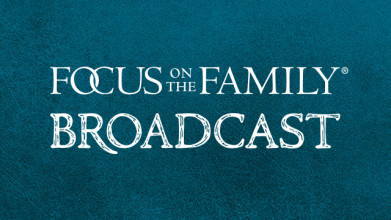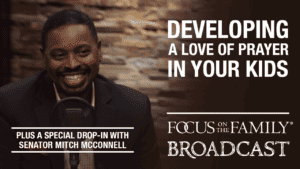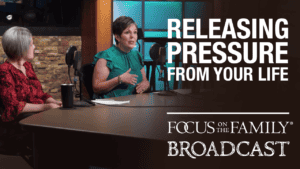Preview:
Melissa Ohden: That’s what I would encourage people to do, whether you’re testifying before Congress or having what seems to be a heated conversation with someone or you’re, you’re on social media, realize that you may never know the impact that you’re having, but you have to have faith that in that moment, you are saying and doing something that has the opportunity to transform that person’s life, can bring about conversion.
End of Preview
John Fuller: That’s Melissa Ohden, and she joins us to share her story as an abortion survivor on today’s episode of Focus on the Family with Jim Daly. Thanks for joining us. I’m John Fuller, and let me note that this program does contain some mature themes not suitable for younger children.
Jim Daly: Uh, John, while the issue of abortion has divided the country for decades, literally, um, probably very few people have heard the stories of those who have survived an abortion attempt, and there are hundreds, if not, thousands, that are in that space, and I can only, uh, sympathize and empathize with them that I’m sure they feel voiceless sometimes.
John: Mm-hmm.
Jim: Like we are here, and we want to be heard. Uh, many people view abortion as necessary. Uh, when talking about abortion, they may use terms like healthcare family planning, uh, smart move, uh, basic human right. You’ve heard a lot about that in the news lately, especially with Roe v. Wade being overturned. It’s now in all 50 states, and all states are seemingly going different directions, some restricting abortion access, others making it right to the point of birth …
John: Mm-hmm.
Jim: … that you can eliminate a child’s life. So we want to delve into this topic of the abortion survivor. We have two wonderful guests to talk about this with us today.
John: Right, and Melissa Ohden is an author and speaker, and is on the board of directors for the Vitae Foundation. She, uh, also started the Abortion Survivors Network, and as I indicated, she’s a survivor of abortion. We’ll hear of her story. Also with us is Priscilla Hurley. Priscilla is a veteran health educator, and, uh, has a lot of experience in family planning, pregnancy counseling, and maternal child health, and she is a former abortion worker. Uh, Melissa has written a book, published by Focus on the Family, and it’ll be the subject of our conversation today. It’s called Abortion Survivors Break Their Silence. And you can learn more about the book, which has both stories of Melissa and Priscilla, uh, at our website, and, uh, that’s focusonthefamily.com/broadcast.
Jim: Melissa and Priscilla, welcome.
Priscilla Hurley: Thank you.
Melissa: Thank you so much.
Jim: It’s so good to see you again, Melissa, and Priscilla, this is your first time with us-
Priscilla: Yes.
Jim: … so great to have you as well.
Priscilla: Thank you.
Jim: It is a heavy topic, but, you know, one of the things, I mean, in my heart is the joy I see, uh, and feel in seeing you. I mean, you are … You should not have been here, either one of you. Think of that. Think of your children now. You both have children. You have grandkids, Melissa.
Melissa: Mm-hmm. Yeah.
Jim: I mean, it tears me up. I-it’s almost like those who oppose this don’t understand this …
Melissa: Yeah.
Jim: … the sanctity of life and what this means. I mean, you would have not been here. Your children would never have been born. Um, that, right there, carries so much weight for me, and that’s why Focus will always be pro-life. But speak to that, I mean, just the fact that you exist.
Melissa: Mm-hmm. I have said a lot recently. I don’t feel like I need to justify-
Jim: Not at all.
Melissa: … existing anymore, right? And, and I say that because, I think, everybody feels like there’s something in their life that they have to try to justify or explain, and we shouldn’t have to justify the simple act of being born.
Jim: That’s so true. I guess, uh, the thing is, I mean, who else in this experience of life has to start with combat, fighting for your life, without even knowing what you’re doing as an infant-
Melissa: Mm-hmm.
Jim: … as a baby? And many people have heard your story, but I want to touch on those details, if you could do that. Just for the listener, for the viewer, um, what happened to you, and, uh, yeah, (laughs), that may help them fill in some blanks here?
Melissa: Absolutely. I have led a very long and winding journey, to now, my story. I’ve known you guys for a long time now, so you know this has been even a process in the last 10 years for me to know more of my story, but I now know that 46 years ago … I’m 46. We’ll get that detail out of the way.
Jim: (laughs)
Melissa: I mean, big pause, right? 46 years ago, my birth mother fits most statistics for women when it comes to abortion. She was 19, she was a college student, she wasn’t yet married to my biological father, and sadly, she fits that statistic of being forced to have an abortion, the type of procedure that was forced upon her by her own family. Uh, this is what we have to face. This is part of what I talk about in my book. This is a, a family issue. It doesn’t just affect the baby, it doesn’t just affect the woman, this, uh, affects an entire family, but in their circumstances, her family forced a saline-infusion abortion upon her. That procedure was the most common one back in the 1970’s, and it involved injecting a toxic salt solution into the amniotic fluid surrounding me in the womb. So I was poisoned and scalded for what was meant to be about three days. That’s usually how long that procedure lasted.
Jim: Mm-hmm.
Melissa: But we actually know, through my medical records, that I soaked in that toxic salt solution for five days.
Jim: Huh.
Melissa: They just kept trying to induce her labor, and I often joke. I’m a little stubborn. Very stubborn, actually.
Jim: (laughs)
Melissa: I was (laughs) not budging every time they were trying to induce her labor.
Jim: Mm-hmm.
Melissa: And so, of course, they had every belief that the abortion would succeed in doing what it was supposed to, which is taking my life, but I now know that they started to fear that she was gonna lose her life over those five days as well. We don’t talk about that in our culture.
Jim: Uh-huh.
Melissa: That’s not the message that women get about abortion. And by the grace of God, on that fifth day, I was “Accidentally born alive.” I like to say bo-born alive on purpose, right? God did that.
Jim: Yeah.
Melissa: I’m so grateful, but I was born alive in the final step of the abortion procedure. I’m sort of the poster child of what most people think an abortion survivor is, but really, what I want people to learn is our experiences are so diverse.
Jim: Right, but, the, again, the outcomes, meaning, born alive, and, uh, it’s quite the, uh, difficulty for the, uh, abortionist in that moment, ’cause they’ve gotta figure out what to do, right? We’re gonna talk more about that later. Priscilla, let me get you in the discussion here. We’re gonna talk more about your story, uh, in a, in a moment, but from the perspective of someone who worked in that industry, and, you know, some people are gonna be shocked, but you did work for an abortion clinic, and we’ll get to that, what are the risks involved for a nurse to save the child when it’s born alive, when the abortion has failed? I mean, you’re in the operating room. Wa-What do you do?
Priscilla: Well, the details of my experience in the industry were just, were not that far along. We didn’t do saline abortions, um, just vacuum aspiration abortions, which started popping up in the ’70s after Roe v. Wade-
Jim: Uh, describe … I mean, for some of us, we don’t know what that is. What is that?
Priscilla: Well, a vacuum aspiration is a local anesthetic and it’s, um, done up to 12, sometimes 13 weeks back in my experience. And, um, and, you know, basically, it’s, uh, a suction machine that is inserted into the uterus and-
Jim: And just, taking the baby right out.
Priscilla: And they turn the machine on, and-
Jim: Yeah.
Priscilla: … the baby’s taken.
Jim: Let me ask you this. You, you mentioned in the book, uh, what we were talking about a moment ago when this baby is actually born alive, to probably everyone’s surprise, uh, they call it the dreaded complication.
Priscilla: Mm-hmm.
Jim: Think of that.
Priscilla: Mm-hmm.
Jim: That just sounds so dark to me.
Priscilla: It is. (laughs)
Jim: Here, this, this baby is-
Priscilla: Yeah.
Jim: … born and survived-
Priscilla: Yeah.
Jim: … this abortion attempt, and they call it the dreaded complication.
Priscilla: Mm-hmm. Yeah.
Melissa: And I think that’s what I want people to understand as well, when they hear the media or the culture saying, “I don’t know why you guys keep talking about abortion survivors and born alive infants,” “This isn’t a thing,” “Legislation isn’t needed.” Then, why did abortionists term us the dreaded complication decades ago? Doesn’t that tell people-
Jim: Mm-hmm.
Melissa: … what they really think about us? Doesn’t that guide the way that they treat us?
Jim: Mm-hmm. Absolutely. I mean, it’s, uh, it’s a tell, right? It-it’s a tip of what they’re really thinking. You’ve testified at Congress and things like that. What is that like to be in front of antagonists who are so sold out to the ideology they can’t stop and think of the lack of wisdom of it, the lack of humanity of it. I mean, they have more compassion for puppies and turtle eggs, and, than they do human beings.
John: Mm-hmm.
Melissa: Mm-hmm.
Jim: I mean, how do you sit there in front of those people who are just, I’m sure, looking at you with such contempt?
Melissa: Mm-hmm.
Jim: Describe that.
Melissa: I’m gonna share very vulnerable look at that, that I haven’t actually shared publicly. When … One of the times I testified, Senator Feinstein, who recently passed away, was there-
Jim: Mm-hmm.
Melissa: … and it was a very heated conversation. And part of what I was saying in my testimony was, you know, “Have you ever considered that I have this supposed right as a woman to have an abortion?”
Priscilla: Mm-hmm.
Melissa: “But I didn’t have the simple right to be born? If I hadn’t have first been born, there would never be any other right to come, so how can you reconcile that?” That was my big question. And after I testified that day, she came up to me-
Priscilla: Mm-hmm.
Melissa: … and she looked at me in the eye and she said, “I want you to know that I heard you.”
Jim: Huh.
John: Mm-hmm.
Melissa: And that was (laughs) my response too, right? I was like, “Oh my goodness.”
Jim: Yeah.
Melissa: “I’m gonna take that as a win.” And so that’s what I would encourage people to do, whether you’re testifying before Congress or having what seems to be a heated conversation with someone, or you’re, you’re on social media, realize that you may never know the impact that you’re having, but you have to have faith that in that moment, you are saying and doing something that has the opportunity to transform that person’s life, can bring about conversion.
Jim: This … I can’t think of a, uh, uh, um, better illustration of the reality being right in front you-
Melissa: Mm-hmm.
Jim: … how they can argue that you should never have been born. I mean, it, it’s-
Melissa: Mm-hmm.
Jim: It’s ridiculous.
Melissa: Mm-hmm. It’s-
Jim: And it’s just so baseless.
Melissa: It’s so dehumanizing.
Jim: Dehumanizing. Priscilla, let-let’s get into your story. You experienced a lot of hurt from abortion-
Priscilla: Mm-hmm.
Jim: … and you too are a survivor-
Priscilla: Mm-hmm. Yes.
Jim: … your mom. And describe what your mother experienced, what the environment was for her and how you came into the world yourself?
Priscilla: Well, um, much like Melissa’s mom, I was 19. Um, I didn’t have a pro-life mother, even though she had four children before I was born, and she told me several months after, my own abortion that day, again, decided to have for me, basically. I was pretty young and, uh, dependent on them. So, um, she told me several months later that she tried to have me aborted-
Jim: Huh.
Priscilla: … before I was born.
Jim: And you did not know that?
Priscilla: I did not know that until after, you know, she … I guess she gave herself permission to tell me.
Jim: Mm-hmm.
Priscilla: She was widowed with four children, so, you know, she was fearful, like many women are when they are caught in a situation like this. And so, um, she was influenced, I believe, and she went into Mexico and had a D&C procedure, which is a dilation and curettage, which is a surgical abortion. And it was successful, they said, um, so they concluded it must have been a twin that was taken-
Jim: Uh.
Priscilla: … but I was not. So, uh, she went to the doctor a few weeks later and he told her she was four months pregnant.
Jim: Mm-hmm.
Priscilla: So I was born later that year, and, um, raised by her. She was remarried a year later.
Jim: Yeah.
Priscilla: Um, but the consequences of that were, was tremendous in my life-
Jim: Yeah.
Priscilla: … the trauma of it.
Jim: And, you know, the, uh, the, that is typical, that fear, that it happens at that moment. I mean-
Priscilla: Yeah.
Jim: … my mom was 42 when she had me. This is 1961, but in California, if a woman was over 40, the doctors could perform an abortion, uh, in the-
Priscilla: Yeah.
Jim: … hope to avert, uh, you know, uh, a defect in the child. I mean-
Priscilla: Mm-hmm.
Jim: … it sounds horrible, but my father talked her out of it, my alcoholic father.
Priscilla: Mm-hmm.
Jim: Thank you, dad.
Priscilla: Mm-hmm.
Jim: And, uh, you know, I just, again, I, I feel like, um, so much pressure is put on that woman to say, “How can you afford this child?” But the thing was we were poor. We’re a poor family, but we had joy.
Priscilla: Mm-hmm.
Jim: And my mom eventually accepted Christ and-
Priscilla: Mm-hmm.
Jim: … it worked out and-
Priscilla: Mm-hmm.
Jim: … it’s just … I don’t even know of a story that it doesn’t work out.
Priscilla: Mm-hmm.
Jim: I mean, they, they’ve gotta be there.
Priscilla: Right.
Jim: But when it comes to eating and surviving, I don’t think that’s a reason for an abortion.
Priscilla: Mm-hmm. No, but it was … You know, she was afraid. She was, you know … Yeah.
Jim: Yeah. But that’s on the-
Priscilla: Yeah.
Jim: … this end of it. Then, she gets-
Priscilla: Yeah, and I-
Jim: … married a year later, and life works out.
Priscilla: It’s just who … You know, you let the fear be exploited by the industry, and that’s basically what the industry does, you know?
Jim: You then, in college, just to finish that part of your story, so you had two abortions-
Priscilla: Yes.
Jim: … yourself.
Priscilla: Yes.
Jim: Did you … Did it ever … Uh, uh, after your mom told you about this, did it ever click like, uh, “Okay, I’m, I’m doing the same thing my mother-”
Priscilla: I was really in the dark place.
Jim: Uh-huh.
Priscilla: I mean, it was, you know, um … It kind of imposed upon me before I was born, and I think that’s the spiritual dynamic that is not discussed, is you have that, um, destructiveness, uh, that … And, you know, my mom withdrew her love. You know, she just really couldn’t love the way she needed to love her children, and especially me, ’cause I wasn’t supposed to be here, so (laughs), um …
Jim: Did you feel that growing up?
Priscilla: Yo, yes.
Jim: Yeah.
Priscilla: Oh, yes. Oh, yes. Yeah.
Jim: But, even with that, here’s the point, ’cause some people are going, “Well, that’s evidence.”
Melissa: (laughs)
Priscilla: I was unwanted. (laughs)
Jim: But, but the point is-
Priscilla: Yeah.
Jim: … uh, uh, that that may have, uh, carried some wound for you-
Priscilla: Mm-hmm.
Jim: … but I’m sure you prefer to be alive-
Priscilla: Right. Right.
Jim: … and have that wound-
Priscilla: Right.
Jim: … and not ever have existed.
Priscilla: Right. Well, you know, and that’s the story of redemption.
Jim: That, that is.
Priscilla: You know, God, God, you know, He wants us to come to Him in, with our brokenness, and, um, and I think if I can just inject, the, the problem with abortion is that it’s, um, first of all, it’s often the response of sexual sin, but also, you know, it wounds, it damages, it injures. And until we, as survivors, or we, as people have gone through it, worked in the industry, are willing to really talk about that openly and honestly. Um, I think it’s, uh, you know, people just need to get real about it, in my opinion.
Jim: Mm-hmm.
Priscilla: And, otherwise, we just continue to act like it’s a, you know, the dehumanizing thing that it is, and it is.
Jim: Yeah.
Priscilla: It is.
Jim: For sure.
John: This is Focus on the Family with Jim Daly, and our guests today are Melissa Ohden and Priscilla Hurley, and we’re talking about a book that Melissa has written, that has their stories in it, and so much more. It’s called Abortion Survivors Break Their Silence, and we encourage you to get a copy of the book from us. The details are at focusonthefamily.com/broadcast.
Jim: Priscilla, let me come back to you for a minute, because, uh, in the book, you described your second abortion-
Priscilla: Mm-hmm.
Jim: … and the impact it made on you, but then, you know, uh, reading it, uh, I kinda … It was a fast turn for me in terms of you ended up working for an abortion clinic, like the very pain that you were experiencing, the grief, the sadness, all of that. They offered you a job and you said yes. What-what-
Priscilla: I know. Isn’t that crazy?
Jim: No, it’s not.
Priscilla: (laughs)
Jim: I don’t think it’s crazy. I do not. I think it, uh … You’re probably seeking-
Priscilla: Right.
Jim: … acceptance, all the things that we-
Priscilla: Well-
Jim: … as human beings do.
Priscilla: Yes.
Jim: And they extend a job offer to you.
Priscilla: Right. And I, uh, going through that second abortion, I was so alone.
Jim: Mm-hmm.
Priscilla: There was nobody there. I didn’t know what to expect. It was horrifying.
Jim: Yeah.
Priscilla: It was horrifying, and very traumatic. And so coming out of that, when I met these ladies that had this women’s clinic, they had a supportive environment, they did the, you know, e-educational information and what to expect. I mean, it was just supportive, and they had people go through. It was like framed in this really, you know, “We care,” (laughs), um, you know, frame, but, uh … So I was attracted to that because of, of the appeal that that had at me at the time.
Jim: You found community.
Priscilla: Yes.
Jim: (laughs)
Priscilla: And I want … And I, I, I felt-
Jim: Yeah.
Priscilla: … maybe I wanted to help other women not have to go through it the way I did-
Jim: Interesting.
Priscilla: … um, but I was still in that captive place of the darkness of abortion. I mean, that just followed me (laughs) for, (laughs) for many years of my life, and-
Jim: Mm-hmm.
Priscilla: … Um, so …
Jim: We’re gonna … We’ll cover more of that, of, uh, um-
Priscilla: Mm-hmm.
Jim: … next time, but Melissa, let me bring you back in here. You encountered, uh, a man at the 2010 March for Life who had a, uh, uh, uh, something in common with you.
Melissa: Mm-hmm.
Jim: Describe what happened and the impact that, that made on you.
Melissa: It’s interesting because so many people don’t even know that abortion survivors exist, or they think that there might just be a handful. Even in the, you know, people who identify as pro-life think, “Oh, well, there just must be a few of you,” and I certainly felt that way. I think every survivor feels like they’re utterly alone, because if the culture is not safe, if families aren’t breaking their silence, if we don’t have a place like the Abortion Survivors Network for them, how would they ever know? And so that what … That’s really what set the stage, for me, is … And I was just a few years into sharing my story and being a part of the pro-life movement, and I was speaking at the March for Life in Canada, and not long after I got done speaking, I mean, I’m, had kind of called out, “I’m one of you.” And, of course, panic was mildly setting in, thinking, “Oh my goodness, did he hear me wrong?,” as I was speaking. “Does he know who I am?,” because I was so new to finding out that there were other survivors, but when he approached me that day, he was able to show the back of his head-
Jim: Mm-hmm.
Melissa: … which had a dent in it. He was very young, in his, you know, early 20’s. He found out that he had survived a partial birth abortion when he met his biological mother.
Jim: Huh.
Melissa: And that was, that was one of my big aha moments of going, “Oh my goodness, I, I am not alone and we are everywhere.”
Jim: Yeah.
John: Mm-hmm.
Jim: Literally, hundreds, if not, thousands of abortions-
Melissa: We’re talking thousands-
Jim: Yeah.
Melissa: … if not, tens of thousands-
Jim: Yeah.
Melissa: … based on the data out of Canada that our team now runs.
Jim: Mm-hmm.
Melissa: Mm-hmm.
Jim: One of the things that, uh, shocked me is I’ve watched the momentum of the abortion industry and the way women will march in D.C.. Uh, I’m stunned at the effectiveness that they have achieved, and separating a mother’s instinct, her-
Melissa: Yeah.
Jim: … her spiritual, innate desire to protect that child, which is God-given, in my opinion-
Melissa: Mm-hmm.
Jim: … and, uh, and to separate her from that-
Melissa: Yeah.
Jim: … feeling. that’s powerful. That is, I think it’s extremely dark and evil, but to be able to separate a woman from the love for that child in her womb, speak to that.
John: Mm-hmm.
Melissa: Well, and I think that’s what the other side has done, is they have pitted women against children.
Priscilla: Mm-hmm. Yeah.
Melissa: And so that’s, I think why people have such a guttural response to-he, even the words, abortion survivors, because they kind of got, “Oh. Oh. Listen, I mean, I’m sorry that you went through what you did, but-”
Priscilla: Yeah.
Melissa: “… I support a woman’s choice.” My birth mom and I were not enemies.
Jim: Right.
Melissa: We weren’t then, we aren’t now. And I think that’s one of the most powerful things about the book, is helping people understand these are two people who are not enemies.
Priscilla: Uh-huh.
Melissa: They are not in conflict with one another. Every human being is more than a choice. I can’t think of any other set of circumstances in our world, Jim, where people would go, “Hey, listen, it is okay to end that person’s life.” I mean, certainly, we see that slippery slope with euthanasia, because we know that slippery slope, but I can’t think of any other circumstance where people would say, “Yes, we are going to choose this life over another, and we are actively going to make it an agenda.” Right? This is going to become a momentous-
Priscilla: Yeah.
Melissa: … political drive that we are going to seek to do.
Jim: Let’s end with this one, uh, for the listener, the viewer, who, who, uh, can relate to the stories that we shared today. Maybe they’ve gone through it-
Priscilla: Mm-hmm.
Jim: … on one side of this or the other. How would you encourage them to speak up and share the truth about life in a world that, man, is so divisive right now? These are flash words when we start talking about the importance of life, the better choice for a woman to make. Uh, how do we do this in such a way that is effective?
Priscilla: The only thing I wanna contribute is that, uh, women and men need to be healed if they’ve had experiences-
Jim: Yeah.
Priscilla: … with abortion, and, and it’s not until then that you can, uh, help others and talk transparently about it, um, and encourage other people pray for other people, and it’s really gotta come down to that, I think, is one in four women, probably that there’s more than that-
Jim: Mm-hmm.
Priscilla: … have abortions, which if-impacts families. The abortion survivor piece is, is, um, is just unique in all of (laughs) in itself. And, um, you know, we have truly a voice for the voiceless-
Jim: Mm-hmm.
Priscilla: … having survived an attempt on our life before we were born.
Jim: That’s, again, uh, what we said at the top, is so true, that you guys, right from the get-go were fighting against people trying to end your life.
Priscilla: I know, just-
Jim: I mean, not many people have that experience.
Priscilla: No.
Melissa: One of the things I’d like to encourage listeners to keep in mind is that our words carry power. Just like the other sides, words are so powerful. That’s why we’re in the position that we are, and we often feel like that we are on the defense, and not on the offense. And I think it’s this fine balance of speaking truth, but also knowing that it takes time for those conversions to take place, so be willing to have those conversation time and time again-
Priscilla: Yeah.
Melissa: … with people. Uh, be willing to get educated, right? Learn more. Understand what a failed abortion is, a stopped abortion, a reversed abortion is, so that when you even say the words, abortion survivor, and people go, “Oh, that doesn’t happen,” you could say, “Well, do you know that this is what that means?” I mean, we have to, to some extent, do more work than the other side has to-
Priscilla: Mm-hmm.
Melissa: … in terms of knowing what everything is and how to talk about it, but I would say do the hard work and keep walking it out with people.
John: Mm-hmm.
Jim: You know, and for me, that’s evidence of a fallen world-
John: Mm-hmm.
Jim: … to be blunt, the fact that we can’t agree that a baby should be protected-
Melissa: I know.
Jim: … and nurtured, and that community should come around that mother, and hopefully, uh, husband or boyfriend, whatever the situation is. The fact that we’re choosing to terminate a life shows you the darkness in the human heart.
Melissa: Yes, it is.
Jim: And to me, that is the distinction between good and evil.
Melissa: Right.
Jim: And it’s not the woman who’s … Uh, I get that. It is … That is not a guilt trip. I mean, she’s in a tough spot, but where are the people to step up with her and say-
Melissa: Yeah.
Jim: “We will help you through this”?
John: Mm-hmm.
Jim: From what I understand from the data, correct me if I’m wrong, but if an abortion-minded woman had one person in their life-
Melissa: Right.
Jim: … that was willing to stand with them, they most likely would choose life for their baby. Are we that sick as a culture, that there isn’t one person that can stand there with her and say, “I’m gonna help you,”-
Melissa: Mm-hmm.
Jim: “I will support you,” “I will be there for you,” “Move into our home,” “We’ll do whatever we need to do, but let’s, let that baby have life and have a chance at this life”?
Melissa: Well, I think that’s where we see evil abounding, don’t we, where-
Priscilla: Yeah.
Melissa: … we see the enemy is loving, that this becomes this, you know, hyperpoliticized issue, not to say that it’s not important. Obviously, I believe legislation saves lives. I want that, but I think the enemy loves to see this battle waging and attention being there, and funding going there. All the while-
Jim: Yeah.
Melissa: … the people who really need help are going underserved and unseen.
Jim: Yeah. Well, and the, the last thing I’ll say, and we’ll pick up next time, Priscilla, I wanna go more into your story, and Melissa, uh, you-you know, your understanding of the landscape of all of this, but right now, even in the country with the political debate that’s going on, and, you know, there’s been seven, I think, seven bills that have not worked well for the pro-life movement, and all the pundits are saying, “This is a losing strategy,” and all those kinds of things. Well, guess what? This isn’t a political issue. I’m sorry, the culture can go where it’s gonna go.
Melissa: Mm-hmm.
Jim: But we, as Christians-
Melissa: Yeah.
Jim: … we’ll stand for life.
Melissa: Mm-hmm.
Jim: And you can make fun of us, you can ridicule us, but we’re not moving-
Melissa: Mm-hmm.
Jim: … because we’d rather be right with God than right with the world.
John: Mm-hmm.
Jim: And the-that’s my commitment. I know that’s yours too.
Melissa: 100%.
Jim: And I, you know, I’m just saying don’t be weak-kneed to the fellow believers. Uh, just stand firmly-
Melissa: Yeah.
Jim: … confidently, lovingly-
Melissa: Mm-hmm.
Jim: … even if, even if (laughs) both political parties, uh, start to move away from this, and, uh, because it, this isn’t at its core political issue, it’s a moral issue.
Melissa: Yeah.
John: Mm-hmm.
Jim: And we should never waiver.
Melissa: Yeah.
Jim: Thank you for being with us today.
Priscilla: Thank you.
Jim: Appreciate it. Let’s come back and, and talk more about this, uh … Whooh! Uh, you know, there’s a lot in there. (laughs)
John: A lot of-
Jim: You can feel that emotion.
John: … compassion, Jim. Oh, totally.
Jim: But, uh, I do hope that people will pick up this great book, Abortion Survivors Break Their Silence. Man, hear from the victims. I mean, even if you’re opposing life, uh, have the courage to listen to the story, to read this story-
John: Mm-hmm.
Jim: … and then make decisions, uh, I mean, my challenge to you, and if you’re in the pro-life community, support the ministry at Focus. You know, we are doing everything we can to be that organization, to step in that gap so that woman can choose life. We’re helping pregnancy resource centers to do all they can do, job training, job placement, budgeting, uh, items for the baby and for her, cribs, and formula, and all the things that need to be done, in addition to simply getting them an ultrasound to see their baby so they’ll choose life.
John: Mm-hmm.
Jim: So step into this. It’s $60 a month through that program, can save a baby’s life. Jean and I do it. I hope you’ll do it too. Can we afford $60 to save a baby’s life? I hope the answer is yes.
John: Mm-hmm. Yeah, join the support team. Save a baby’s life with a $60 donation to Focus on the Family’s Option Ultrasound Program, and, uh, take advantage of all the resources we have. When you join the support team, we’re gonna say thank you by sending a copy of Melissa’s book. It’s once again called Abortion Survivors Break Their Silence. Uh, all the details about the book are at focusonthefamily.com/broadcast, or call 1-800, the letter A, and the word, FAMILY. That’s 800-232-6459. And on behalf of Jim Daly and the entire team, thanks for joining us today for Focus on the Family. I’m John Fuller, inviting you back as we continue the conversation, and once again, help you and your family thrive in Christ.










